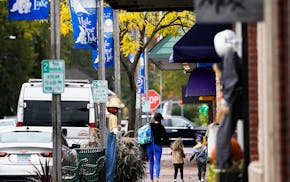Elderly and disabled Minnesotans who would rather stay in their homes or apartments than move to nursing facilities could get some help from an innovative new program funded jointly by the state and federal governments.
The Department of Human Services (DHS) announced Wednesday it will receive $58 million in federal money to provide home-care services that could save the state money in the long term by keeping frail and disabled people out of expensive, long-term care facilities funded by Medicaid.
The initiative is part of a broader state effort, known as "Reform 2020," to rein in the ballooning costs of caring for the estimated 350,000 Minnesotans who are elderly or disabled and receive assistance from the state. Taken together, the elderly and disabled populations represent nearly 30 percent of those enrolled in Medicaid in Minnesota, but account for nearly 70 percent of the program's expenditures.
The state-federal Medicaid program spent $8.24 billion during the last fiscal year on 732,000 Minnesotans, up from $4.7 billion for 443,000 Minnesotans in 2003.
DHS Commissioner Lucinda Jesson said the long-term care system is "unsustainable" without reform.
"If we don't make some additional changes to the system, we will see our health care and Medicaid budget balloon in a way that will leave very little money for some of the other priorities in Minnesota, such as education," Jesson said.
With earlier intervention, more elderly and disabled people can stay in their homes for less cost, Jesson said.
For instance, the state plans to provide more direct help for older adults and their family members as they navigate the long-term care system and identify home-care services.
DHS also will direct more money to nonprofits that provide meals, transportation and other services that help people stay in their homes.
Jesson gave the example of a Mankato-based nonprofit named VINE Faith Action, which recently helped a couple in their 80s stay in their home by installing laundry appliances on the main floor so they would not have to walk up and down stairs.
"A lot of people would choose to be in their homes if they knew they could do it with supports," Jesson said. "It may be that people need something small, like shoveling sidewalks."
As part of the initiative, DHS also plans to create a central switchboard for reporting abuse of senior citizens and other vulnerable adults.
Currently, incidents of abuse can be reported to more than 160 separate phone services and county offices across the state, which makes it difficult for state authorities to respond.
"If we're going to do more to keep people in their homes," Jesson said, "then we need to beef up adult protection services."
Chris Serres • 612-673-4308
Twitter: @chrisserres

Shop the curbs for free on 'Trash to Treasure Day' in White Bear Lake

Longtime Uptown boutique closing in May

Meet the Athena Award winners: 103 female athletes honored by their schools

Lacrosse lists: 21 top players and the school that's No. 1 for boys and girls

